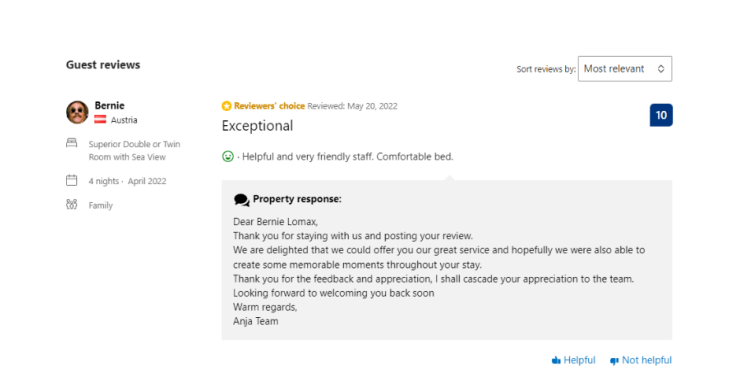How to respond to hotel reviews on OTA Channels
Online reviews are critical to the success of any accommodations. The star rating that certain platforms place on your listing can have a huge effect on your ability to attract guests and earn money. While your rating will largely be determined by the guest experience you deliver, there’s another way to mitigate the negative effects and maximise the positive effects of reviews: posting a response. In this post we’ll look at why responding to reviews is important for hotels, and how a carefully crafted response can benefit your business.
About hotel feedback/ reviews?
The expectations of every guest are different, so no matter how incredible your hotel is, there will come a time when a guest leaves a less-than-perfect review. It’s inevitable, and may even come down to factors beyond your control. But you’re far from powerless against mixed or outright negative reviews. You can respond to them.
The first and in some ways biggest challenge is simply finding the time to respond. It can be easy to push this task down the priority list, but it is one that you need to set aside time for, for a few very good reasons.
According to TripAdvisor, hotels that respond to reviews are 21% more likely to receive booking inquiries than those that don’t offer any responses. If you respond to more than half your reviews the number rises to 24%. The same study also found a direct correlation between review responses and review rating – the more responses, the higher the rating, and the more bookings a hotel enjoys. Responding to reviews, whether positive, negative or mixed, is important. The next question: how?
Why are feedback/ reviews really important?
In today’s marketing-savvy world people don’t necessarily trust businesses to talk about themselves. They do, however, trust other people.
Reviews are a modern, large-scale form of word of mouth marketing. They give potential guests real insight into the thoughts and experiences of previous guests. Add in the anonymity that the internet offers, and online reviews offer particularly honest and revealing feedback.
What’s more, this feedback is taken seriously by other users. 90% of people read online reviews before visiting a business, and somewhat surprisingly, 88% of consumers trust online reviews as much as recommendations from family and friends. This means that a five star review can be as good as a guest’s loved ones personally recommending a stay at your property.
Good reviews have a tangible effect on your bottom line, as according to InvespCRO, customers are likely to spend 31% more at a business with ‘excellent’ reviews.
Reviews also show you how you can improve your hotel. Some guests aren’t comfortable sharing feedback face-to-face, but are more than happy to offer constructive criticism over the internet. If it’s reasonable you should take this feedback seriously.
As such you should actively encourage people to leave reviews across all your different channels, and to actively manage your reputation by responding to those that are left. And this process needn’t be as laborious and time-consuming as you might imagine – particularly if you use a hotel property management system like Little Hotelier.
Read more: Tips to respond reviews to OTA channel like Airbnb
How do you respond to a good guest review?
Let’s begin with the positives. How do you respond to a nice guest review? The following tips can help:
- Never use a template. Cookie cutter responses can do more harm than good, and guests can smell them from a mile away. Make each response unique, address the person by their name and refer to specifics that they mentioned in their review.
- Use ‘we’ instead of ‘I’ in responses to positive reviews. This shows that your team is united and that you share your wins with each other.
- Thank the guest for their review.
How do you respond to a negative hotel review?
Negative or mixed guest reviews are a little more complicated to respond to. You need to carefully navigate the criticisms, accepting those that are fair while explaining any potential misunderstandings and misconceptions.
As a starting point, you should trade the ‘we’ for ‘I’, as this makes someone responsible for righting the guest’s perceived wrong. The best responses to negative or mixed reviews take the form of a sandwich, where negatives are placed between two slices of positivity:
- Thank the reviewer: They took the time to provide feedback and should be thanked for doing so.
- Highlight any positives: If the guest gave a mixed review, tell them that you’re glad they liked a certain aspect of their stay.
- Address the negatives: If the feedback is fair, accept it graciously, apologise for the experience, ask for more information, and outline how you plan to avoid the situation in the future. If you feel the feedback is unfair, ask for more info, consider saying sorry that the guest didn’t feel their expectations were met, then offer your side of the story in a humble, calm and objective manner.
- Return to a positive: Offer up another example of something that the guest enjoyed, or return to the earlier positive.
- Extend an invitation: Invite the guest to return. This shows that you’ve taken their feedback on board and are keen to do better next time.
An example of responding to negative guest feedback:
Dear Greg and Julie,
Thank you for taking the time to share your feedback. I’m glad to hear you enjoyed our on-site restaurant, though I’m saddened to hear that we didn’t meet your expectations in other areas. We take feedback seriously, and I’m eager to hear more about your experience. If you are so inclined, please call or email me using the details below. Nonetheless, I’m pleased to hear that you enjoyed other aspects of your stay, and I’d be honoured to host you again.
Jennifer H, General Manager (Phone/email)
Should hotels respond to every review?
If responding to reviews is good, you should aim to reply to every one, right? Not necessarily. Replying to every review can be impractical, and can see you fall into the trap of offering generic, impersonal responses. Rather than replying to every compliment, your time will be better spent forming considered responses to negative and mixed reviews.
According to Cornell University, a nice response rate to aim for is 40-50% of all reviews. You should aim to respond to every negative and mixed review, as these have the potential to do the most damage, and are the ones that the eyes of potential guests will be drawn to.
A better way to manage guest feedback
Unlike other businesses that may only need to keep abreast of reviews and ratings on a handful of platforms, like Google, Facebook and TripAdvisor, Hotels need to stay across a huge number of guest review systems on different booking channels. Booking.com, Expedia, Airbnb; the list goes on and on.



